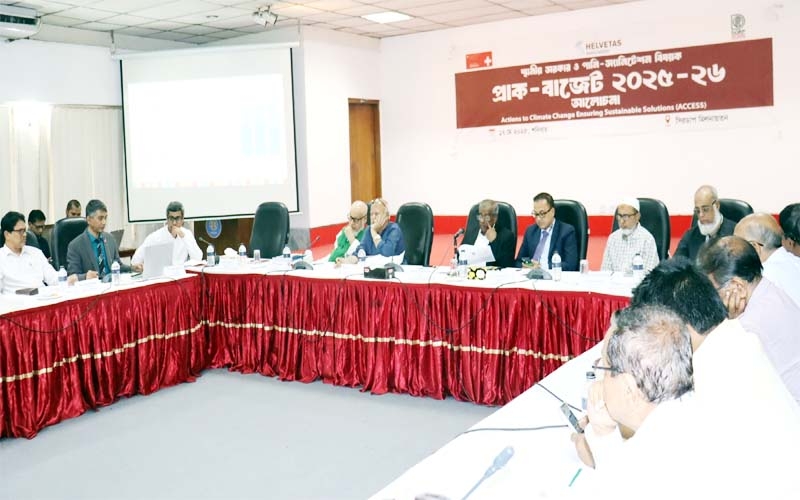- Israel Strikes Tehran with US Support Amid Nuclear Tensions |
- India Sees 9% Drop in Foreign Tourists as Bangladesh Visits Plunge |
- Dhaka Urges Restraint in Pakistan-Afghan War |
- Guterres Urges Action on Safe Migration Pact |
- OpenAI Raises $110B in Amazon-Led Funding |
Experts Urge Dedicated Budget for WASH Sector in FY26

Development experts, policymakers, and civil society leaders have called on the government to allocate a dedicated sectoral budget for WASH (Water, Sanitation, and Hygiene) in the upcoming national budget for 2025–26, warning that continued project-based funding is leading to fragmented implementation and long-term setbacks.
The demand was raised at a pre-budget dialogue titled “Local Government and Water-Sanitation Pre-Budget 2025-26,” organised by Development Organisation of the Rural Poor (DORP) under the ACCESS project, with support from HELVETAS Bangladesh. The event was held at the CIRDAP auditorium in Dhaka.
Speakers at the discussion emphasised that WASH initiatives often stall once individual projects end, leading to a halt in progress and wasted investments. They called for the integration of WASH as a permanent sector in the national budget to ensure continuity and sustainability, particularly in vulnerable areas like the hill tracts, haor, and coastal regions.
Dr. Tofail Ahmed, Chairman of the Local Government Reform Commission, stressed the urgent need for decentralised budget planning and a clear vision for WASH. “Water is not just for drinking—it’s vital for agriculture, industry, and sanitation. Yet we lack a national vision. The water crisis has already begun,” he warned.
He criticised the absence of transparency and coordination, saying, “Budget allocations reach various institutions, but there are no mid-year updates, and even district officials remain unaware of expenditure levels.”
Dr. Mohammad Helal Uddin, Executive Vice Chairman of the Microcredit Regulatory Authority, echoed the call for decentralisation, stating that most tax revenues are spent on recurring costs while development projects depend heavily on loans.
Dr. Zillur Rahman, Managing Director of the Bangladesh NGO Foundation, highlighted the need for capacity building and efficient utilisation of funds. “Budget allocation must reflect real needs. Health sector investments will deliver measurable outcomes,” he said.
Sabbir Ahmed, member of the Bank Reform Task Force, observed that while the government shows intent, financial constraints—aggravated by a rising burden of domestic and foreign debt servicing—limit what can be done.
In his presentation, A.H.M. Noman, Founder and CEO of DORP, advocated for a “mother- and child-centric Dream Package”, calling for a long-term commitment of 20 years to eliminate poverty and hunger.
DORP Chairman Mohammad Nurul Amin, who presided over the event, warned of an impending global conflict over water. “The third world war will be over water. We must prioritise education, health, and governance to ensure real development,” he said.
Dr. Mahfuz Kabir, Director of Research at BIISS, stressed the need for timely and increased allocations, especially for local government bodies. “Delayed or insufficient funding undermines results. Coastal WASH activities need urgent attention,” he said.
Munshi Alauddin Al Azad, former Joint Secretary, called for national-level recognition of sanitation as a health imperative, stating, “Without health, development is meaningless.”
Additional Chief Engineers of the Department of Public Health Engineering (DPHE)—Mir Abdus Sahid and Ehteshamul Russel Khan—highlighted the sector's limitations. “Current allocations are project-based. Without sectoral treatment, budget inconsistency will persist. Most sanitation-related projects have already ended,” they noted.
Mainul Hasan Sohel, General Secretary of Dhaka Reporters’ Unity, and other guests attended the event, moderated by Mohammad Zobair Hasan.
As Bangladesh prepares its next fiscal plan, experts argue that mainstreaming WASH into the national budget is essential for public health, social equity, and sustainable development.

